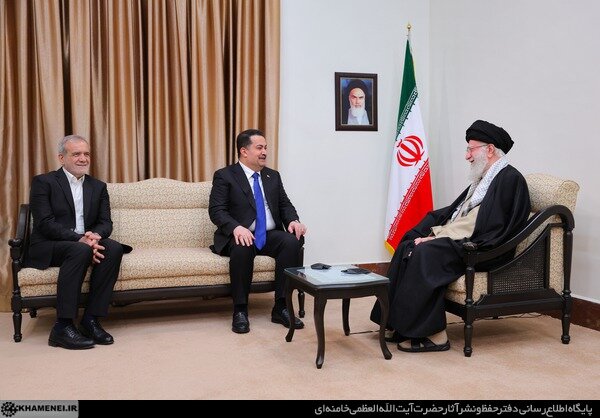TEHRAN – Ayatollah Seyyed Ali Khamenei, the Leader of the Islamic Revolution, has highlighted the Popular Mobilization Forces (PMF), as a key pillar of Iraq's national strength.
In a meeting with Iraqi Prime Minister Mohammed Shia’ al-Sudani, held in Tehran on Wednesday, the leader called for concerted efforts to preserve and strengthen this powerful force amid ongoing challenges to the country’s sovereignty and unity.
He remarked, “As you have noted, the Popular Mobilization Forces (PMF), or Hashd al-Shaabi, play a crucial role in safeguarding Iraq’s strength. Efforts must continue to preserve and further reinforce this significant pillar of national resilience.”
The Leader also expressed concern over indications that the U.S. is actively working to entrench its presence in Iraq, urging Baghdad to stand firm against such moves.
Ayatollah Khamenei characterized this presence as illegal and detrimental to the sovereignty and well-being of the Iraqi nation.
Iraq continues to grapple with terrorism backed by Western and Israeli forces and is pressing for the withdrawal of U.S.-led military forces from its territory, as mandated by a resolution passed in Iraq’s parliament following Lieutenant General Qassem Soleimani’s assassination in Baghdad.
During the meeting, the Leader also lauded al-Sudani for his effective efforts toward ensuring Iraq’s development and security.
Highlighting the deep ties between the two nations, Ayatollah Khamenei underscored that a secure and prosperous Iraq is not only beneficial to its people but also serves the interests of the Islamic Republic of Iran.
During the discussion, Ayatollah Khamenei praised the Iraqi government’s strong rapport with its people, describing unity among Iraq’s diverse religious and ethnic groups as a vital foundation for the country’s progress.
Turning to the region, Ayatollah Khamenei highlighted the ongoing turmoil in Syria, attributing much of the instability to external interference. “The involvement of foreign governments in Syria’s crises is both evident and harmful,” he said, calling for greater regional cooperation to restore peace and stability.
The meeting was attended by senior Iranian officials, including President Masoud Pezeshkian, who welcomed the deepening bilateral discussions.
Prime Minister al-Sudani, in turn, expressed satisfaction with the talks, emphasizing his government’s commitment to strengthening the strategic partnership between Iraq and Iran. He noted that the agreements reached during his Tehran visit would further solidify the two nations’ political, economic, and cultural ties.
Al-Sudani outlined the key pillars of Iraq’s national strength, including its resilient people, the PMF, national unity, and the guiding role of religious authorities.
Addressing recent Israeli aggression in Gaza and Lebanon, he reaffirmed Iraq’s unwavering support for the Palestinian and Lebanese people, as well as for resistance movements throughout the region.
Commenting on the Syrian crisis, the Iraqi Prime Minister reiterated his government’s stance in favor of Syria’s territorial integrity, national sovereignty, and the formation of an inclusive government that reflects the will of the Syrian people. He also stressed the importance of regional solidarity in countering foreign interference and fostering sustainable peace.
Pezeshkian calls for regional stability in talks with Iraqi PM
In a press conference following a meeting with Iraq’s Prime Minister, Masoud Pezeshkian emphasized the Islamic Republic’s commitment to fostering peace, stability, and security across the region.
The Iranian president noted that Iraq is currently enjoying a phase of stability and development after defeating the Takfiri terrorist group Daesh.
"The Republic of Iraq is not only an important neighbor but also a strategic partner for Iran," Pezeshkian stated. "We are delighted that our bilateral relations have reached an optimal level, with mutual cooperation expanding across various fields daily."
Prime Minister Sudani arrived in Tehran on Wednesday, where he was officially received by Iran’s Finance Minister, Abdol-Nasser Hemmati. His visit included high-level discussions held at Tehran’s Sa’ad Abad Historical and Cultural Complex. He also had a meeting with Mohammad Baqer Qalibaf, the speaker of the Iranian parliament on Wednesday.
Sudani expressed that his trip to Iran was part of ongoing efforts to deepen collaboration and strengthen communications between the two countries. He praised the positive outcomes of Pezeshkian’s visit to Iraq last year, during which the Iranian president held extensive talks on economic, social, developmental, religious, and contractual issues. Pezeshkian’s visit also included stops in Baghdad, the holy cities of Karbala and Najaf, the southern port city of Basra, and the semi-autonomous Kurdistan Region.
During the joint press conference, Sudani also addressed regional challenges, particularly Syria’s ongoing instability following the fall of President Bashar al-Assad and the rise of Hayat Tahrir al-Sham (HTS).


No comments:
Post a Comment